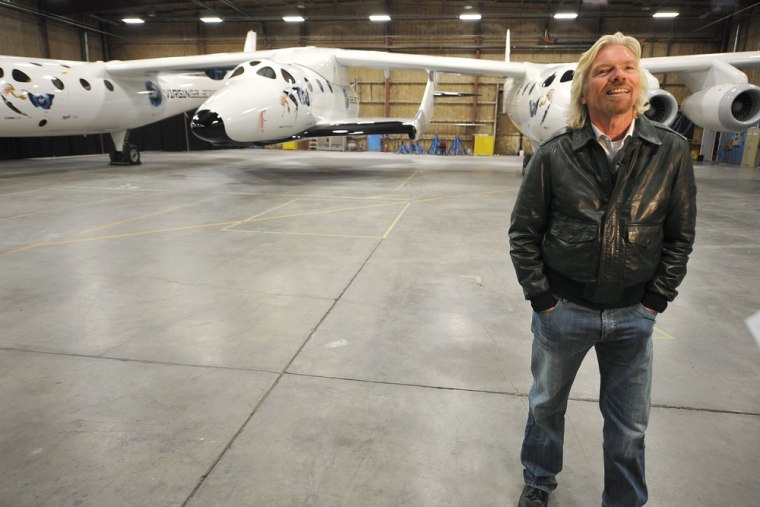As a self-described “adventure junkie,” Yanik Silver of Potomac, Md., has raced cars in Baja, run with the bulls in Pamplona and swum with great white sharks off the coast of South Africa.
Still to accomplish? A trip into suborbital space, a goal the founder of Maverick Business Adventures hopes to achieve as space tourist No. 144 on the Virgin Galactic passenger list when the company begins commercial service in the next 18 months to two years.
The experience won’t be cheap — Silver has already put down a $175,000 deposit on the $200,000 trip — but he’s convinced it will be worth it. “It’ll be an incredible, once-in-a-lifetime experience,” he told msnbc.com.
Seats for 'thrillionaires'
As fans of space travel are well aware, NASA’s space shuttle program is on a glide path toward retirement. On Thursday, Discovery blasted off on its final trip to the International Space Station, to be followed by the final flights for Endeavour (April) and Atlantis (June).
In their stead, a handful of entrepreneurs are hoping to offer commercial space travel for the general public — or at least its most deep-pocketed members. Last month, Space Adventures, which has already taken seven “space tourists” to the space station, announced it would offer three similar trips on Russian Soyuz spacecraft starting in 2013. Factoring inflation, exchange rates and mission profile, the estimated tab for a seat on the 10- to 12-day trip is “probably close to $50 million,” said company President Tom Shelley.
Meanwhile, halfway around the world from the Baikonur Cosmodrome, Virgin Galactic is moving forward with its plans to offer suborbital flights to about 68 miles above the Earth. The flights, which will have space for six passengers, will provide 1,000-mile views and four to five minutes of zero gravity.
At this point, the company won’t commit to a launch date for commercial service, but executives suggest the first experimental flights could take place within the next year. Safety and regulatory issues, they say, will determine the first commercial launch, with Sir Richard Branson, Virgin Group founder, and members of his family filling the first seats.
Assuming all goes well, the other 400-plus people who have put down deposits with Virgin Galactic are expected to earn their space-tourist wings during the year after that. Add another 200 or so who have signed up for planned suborbital flights with Space Adventures — $110,000 to $120,000, depending on payment plan, in a two-person vehicle — and it would seem that space tourism is poised to take off.
Space: the final frontier
So who are these people who have both the will and the wherewithal? “They’re people who want to be part of something because they believe that space is in the future of mankind,” said Shelley. “The rich adventurer who’s run out of places to go does account for some of the interest, but for others, it’s their life savings.”
As chief executive officer of Virtuoso Ltd., the upscale travel network that serves as the exclusive retail agent for Virgin Galactic in the Americas, Matthew Upchurch parses the market slightly differently: “Some are people who have a passion for aviation and have always dreamed of being an astronaut. For others, the essence of great travel experiences is all about getting themselves out of their comfort zone and seeing things from another perspective.”
To serve that diverse clientele, Virtuoso created a network of Accredited Space Agents, or ASAs. To qualify, would-be ASAs had to apply, describe their expertise and clientele and attend a three-day training session at Cape Canaveral or the National AeroSpace Training and Research Center (NASTAR), outside Philadelphia. Currently, there are 72 Virtuoso ASAs and 125 worldwide.
The challenge, says Upchurch, is that there is simply no precedent for selling space travel. “It’s not just basic dates, rates and available space,” he said. “A big part of it is helping people understand what’s going to happen and maintaining engagement with them regarding the milestones of the program.”
And answering their questions. “People are curious about waivers, life insurance and the risks involved,” said Shelley. “We want them to come into it with their eyes wide open.” To ease the process, reservations with both Space Adventures and Virgin Galactic are refundable. “If people change their minds, they don’t incur a big penalty,” Shelley said.
From Kitty Hawk to commercial service
While it’s easy to dismiss space tourism as the private domain of “thrillionaires,” those involved — both providers and participants — insist there’s more to it than that. “The people who are stepping up and supporting this young industry will allow a large percentage of the population to access space in the future,” said Shelley. “We’re going to be talking about thousands and thousands of people.”
“It’s like the Wright brothers,” said Vicki Upchurch, a Colorado-based ASA (and Matthew Upchurch’s sister-in-law). “Little did they know when they flew at Kitty Hawk that before long people would pay to get on an airplane. We’re in the same position now with space travel.”
If that sounds appealing, rest assured that both Virgin Galactic and Space Adventures are still taking reservations. With the former, paying in full in advance will get you an earlier spot (roughly between number 400 and 500); with the latter, an 8 percent discount off the installment plan. If that’s too steep right now, both are accepting deposits of $20,000.
Agents are standing by.
